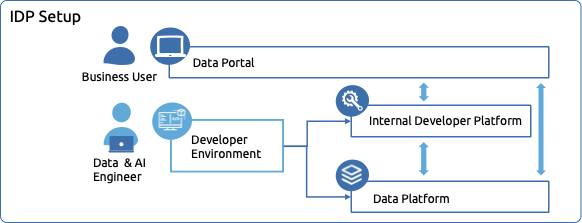Unlocking Innovation With Platform Engineering
Data, AI, and innovation are essential to staying competitive. Organizations need to accelerate development while maintaining quality to remain ahead. Platform engineering, traditionally tied to cloud-native environments and microservices, is now crucial for enabling data mesh architectures, transforming how data products and AI applications are built. Data mesh allows teams to efficiently develop AI models, AI agents, and analytical tools, such as dashboards. Platform engineering provides the infrastructure and standardized processes – known as the Golden Path – that streamline development, reduce time to market, and improve product quality.
Internal developer platforms and data mesh
Internal developer platforms (IDPs), such as Backstage, Port, and Humanitec, are vital enablers of platform engineering and offer self-service capabilities for managing infrastructure, services, and data pipelines. They abstract infrastructure complexity, allowing teams to focus on developing high-quality data and AI products. In a data mesh environment, IDPs provide essential tools and templates that help teams build and manage data products efficiently. They accelerate the creation of data-driven applications by providing standardized workflows and automation tools, enabling teams to follow the Golden Path for faster and more reliable development.
Automated data and AI governance
One of the most significant advantages of platform engineering is automated data and AI governance. Data products are automatically published into data catalogs, while AI models are added to model catalogs with relevant metadata. This ensures consistent governance across the organization and simplifies compliance. When semantic integration is established between data sources, data products, AI/ML models, and analytical use cases, the benefits are even greater. By linking these elements, companies can better track the value of their data and AI assets, improving transparency and decision-making.
Bridging the gap: From data to actionable insights
But the benefits of platform engineering extend beyond the realm of data management. As organizations strive to derive meaningful insights from their data, the need for robust, scalable, and user-friendly analytical tools has never been greater.
Platform engineering provides a framework for the development and deployment of custom data and AI-powered applications, enabling organizations to transform raw data into actionable insights. By streamlining the process of building and deploying these analytical tools, platform engineering accelerates the time-to-market and ensures a consistent, high-quality user experience.

Developing a predictive maintenance data product
Consider a manufacturing company aiming to implement predictive maintenance to reduce factory downtime. The goal is to develop a data product that analyzes machine performance data, detects anomalies, and predicts when maintenance is needed.
- Data ownership and product development: The manufacturing team owns the machine performance data and uses the data mesh model to turn this into a product for preventing equipment failures.
- Internal developer platform: With an IDP, the team follows a standardized pipeline for data ingestion, cleaning, and processing. The platform handles infrastructure, allowing the team to focus on developing the data product.
- Model development: The team builds a machine-learning model to predict equipment failures. The IDP supports training and deployment, allowing data scientists to refine the model’s accuracy.
- Deployment and governance: The model is deployed using the Golden Path, and the data product is automatically cataloged with metadata for transparency. The AI model is similarly added to the model catalog, ensuring proper governance and future discoverability.
In this example, platform engineering streamlines the entire process while ensuring that data and AI governance are automated and integrated, improving both development speed and quality.
The Golden Path: Empowering developers
The Golden Path in platform engineering is used to build and deploy applications efficiently. By removing infrastructure complexity, the Golden Path allows developers to focus on innovation and product development. In the predictive maintenance example, the Golden Path enabled the team to quickly build and deploy its data product. The IDP handled data ingestion, model training, and deployment, allowing the team to concentrate on refining the AI model’s accuracy. By ensuring consistency across teams, the Golden Path helps organizations build AI models, dashboards, and data products faster and with higher quality. It minimizes errors, speeds development, and ensures that best practices are followed throughout the product lifecycle.
AI and data products as beneficiaries
AI applications and data products benefit immensely from platform engineering and the Golden Path. AI models, such as those for predictive maintenance, require large amounts of data, computation, and standardized processes. Platform engineering provides the necessary infrastructure and automation to manage these resources, freeing data scientists to focus on model development. Automated data and AI governance further strengthens this approach by ensuring that data products and AI models are properly cataloged, discoverable, and compliant. This improves the overall value of data and AI assets within the organization, making them easier to reuse and scale.

Faster time to market and increased quality
The combination of platform engineering, data mesh, and IDPs leads to faster time to market for new data products and AI applications. Standardized processes and self-service environments allow teams to move quickly from concept to deployment. Automated governance ensures that data and AI products meet organizational standards for quality and compliance. Moreover, platform engineering improves product quality by enforcing best practices through the Golden Path. This leads to more robust, scalable data products and AI models that align with business objectives and deliver better outcomes. Platform engineering as a catalyst for innovation Platform engineering, combined with data mesh and IDPs, is a powerful innovation driver. By providing standardized, self-service environments, platform engineering accelerates the development of high-quality data products and AI applications. Automated governance enhances the value of these assets, ensuring transparency and compliance. Embrace platform engineering today to accelerate innovation, deliver better products, and gain a competitive advantage in the data-driven world.
(this article also appeared in DPIR 9)